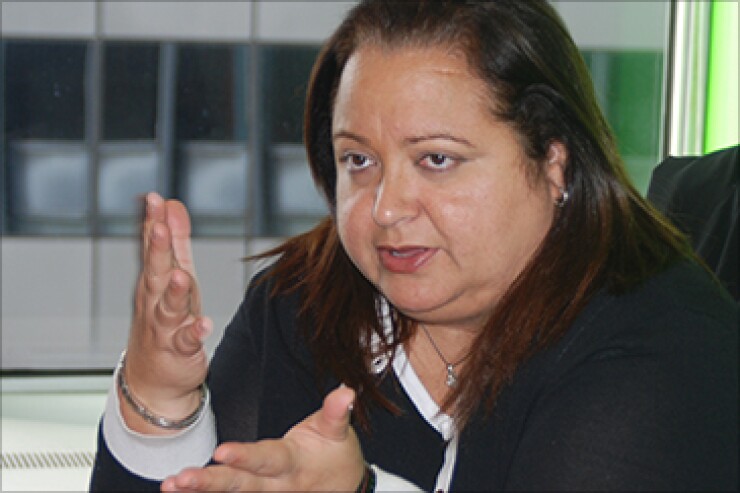
WASHINGTON – Puerto Rico Gov. Alejandro García Padilla announced on Wednesday that the commonwealth will default on $37.3 million out of nearly $1 billion of debt payments due on Jan. 4, a "mild" default, according to one analyst, and one that could threaten the governor's plans for congressional help.
The governor, who has previously said the commonwealth is in a financial death spiral with nearly $72 billion in debt, explained to reporters during a call that the territory will not be able to make $35.9 million of owed payments on Puerto Rico Infrastructure Financing Authority bonds and a $1.4 million Puerto Rico Public Finance Corp. payment.
The commonwealth's payments are technically due on Jan. 1, but because that date is a holiday, the government has until Monday, Jan. 4.
Puerto Rico will be able to make the remaining payments, according to García Padilla, including $328.7 million of interest on guaranteed general obligation bonds. However, the GO payment is only possible because of "clawback" measures the governor ordered on Nov. 30 that allow the commonwealth to divert funds to constitutionally guaranteed payments from those that do not have the same guarantee.
The territory has diverted $163 million of funding previously pledged for payments by the Puerto Rico Highways and Transportation Authority, Puerto Rico Convention Center, and PRIFA, to meet its GO obligations. The clawing back will continue into the new year and the commonwealth does not plan to replenish the diverted funds, meaning the bonds that saw funds diverted can be considered in default.
In addition to the GO payment, Puerto Rico will make its other payments due Jan. 4, including its: $9.9 million payment on Government Development Bank notes; $92 million payment on Public Buildings Authority bonds; $11.4 million payment on PRIFA bonds; $15.4 million COFINA payment; $1.7 million University of Puerto Rico bond payment; $ 9.5 million Puerto Rico Convention Center District Authority bond payment; $101. 7 million Highways and Transportation Authority bond payment; $13.9 million retirement system payment; and $10.1 million Industrial Development Corp. payment.
García Padilla said the non-GO payments were possible because the money had already been reserved with bond trustees before the clawback measures took effect Nov. 30, not because the government specifically chose to pay those bonds as the Jan. 4 deadline approached.
"Today's decision reflects, yet again, the commonwealth's commitment to honoring its obligations in a manner consistent with the Puerto Rico constitution and the provision of essential public services to the 3.5 million American citizens of Puerto Rico," said GDB president Melba Acosta. "However, the use of over $100 million in reserved funds to make debt service payments for several of the Commonwealth's issuers should underscore that the Commonwealth is running out of options to pay its debt."
Daniel Hanson, an analyst at Height Securities, said the expected defaults are "pretty consistent with what was expected" and are "relatively mild."
"To miss $37 million is pretty tame given the governor's repeated pledges about how dire the liquidity situation is and how little Puerto Rico can actually pay," he said. Hanson added he believes that July 1, the date when another large amount of debt payments comes due, will "look a lot like January 1" in that most of the obligations are going to be met because Puerto Rico still has "quite a bit" of revenue that has yet to be clawed back.
Matt Fabian, a partner at Municipal Market Analytics, agreed with Hanson, saying this is "the most benign scenario the market was expecting."
However, he added the commonwealth's decisions going into the Jan. 4 payment should not serve as a precedent for what will happen later, as Puerto Rico does not seem to have a formal process for deciding how money gets allocated and seems to change the bond contracts it chooses to follow.
Both Hanson and Fabian said the defaults are likely to trigger litigation from creditors whose bonds will see a default.
Ambac Financial Group, whose subsidiaries collectively insure more than $863 million in aggregate outstanding principal amount of PRIFA bonds, sent a letter to García Padilla, Acosta, and several other island officials on Dec. 29 taking issue with the provisions of the commonwealth's clawback and implying the company was ready to challenge the clawback's legality.
The January payments and defaults could also put Puerto Rico in hot water with Congress, the analysts said, as the situation is seemingly less dire than what García Padilla has been saying for the past six months.
"When you look at the hyperbolic language the governor has been using for quite some time and the relatively mild defaults that have taken place, Congress is going to go back to the governor and they are going to say, 'Look, we have been challenging you now for a year on your credibility and your inability to deliver audited financial statements and your inability to make changes to spending and taxation,'" Hanson said. That realization could mean Congress moves more toward supporting a control board that would oversee the government's decisions instead of extending Chapter 9 bankruptcy, which has also been proposed.
Congress failed to include legislation that would have helped the island in its year end omnibus package and Democrats and Republicans continue to favor different approaches to the issue. Democrats have agreed with the governor in pushing for Chapter 9 bankruptcy restructuring on the island while Republicans have come out against that proposition and put more weight behind a financial control board.
Before the year-end recess, House Speaker Paul Ryan set a deadline of March 31st for House committees with jurisdiction over Puerto Rico to come up with a workable solution for the commonwealth. García Padilla has said he intends to hold Ryan to that promise.





